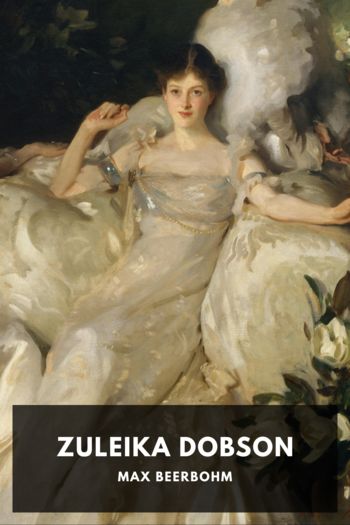Zuleika Dobson, Max Beerbohm [e ink ebook reader TXT] 📗

- Author: Max Beerbohm
Book online «Zuleika Dobson, Max Beerbohm [e ink ebook reader TXT] 📗». Author Max Beerbohm
And now, too, in his darkest hour, it was Greek that surged in him—iambics of thunderous wrath such as those which are volleyed by Prometheus. But as he sat down to his writing-table, and unlocked the dear old album, and dipped his pen in the ink, a great calm fell on him. The iambics in him began to breathe such sweetness as is on the lips of Alcestis going to her doom. But, just as he set pen to paper, his hand faltered, and he sprang up, victim of another and yet more violent fit of sneezing.
Disbuskined, dangerous. The spirit of Juvenal woke in him. He would flay. He would make Woman (as he called Zuleika) writhe. Latin hexameters, of course. An epistle to his heir presumptive … “Vae tibi,” he began,
“Vae tibi, vae misero, nisi circumspexeris artes
Femineas, nam nulla salus quin femina possit
Tradere, nulla fides quin”—
“Quin,” he repeated. In writing soliloquies, his trouble was to curb inspiration. The thought that he was addressing his heir-presumptive—now heir-only-too-apparent—gave him pause. Nor, he reflected, was he addressing this brute only, but a huge posthumous audience. These hexameters would be sure to appear in the “authorised” biography. “A melancholy interest attaches to the following lines, written, it would seem, on the very eve of” … He winced. Was it really possible, and no dream, that he was to die tomorrow—today?
Even you, unassuming reader, go about with a vague notion that in your case, somehow, the ultimate demand of nature will be waived. The Duke, until he conceived his sudden desire to die, had deemed himself certainly exempt. And now, as he sat staring at his window, he saw in the paling of the night the presage of the dawn of his own last day. Sometimes (orphaned though he was in early childhood) he had even found it hard to believe there was no exemption for those to whom he stood in any personal relation. He remembered how, soon after he went to Eton, he had received almost with incredulity the news of the death of his godfather, Lord Stackley, an octogenarian. … He took from the table his album, knowing that on one of the earliest pages was inscribed his boyish sense of that bereavement. Yes, here the passage was, written in a large round hand:
“Death knocks, as we know, at the door of the cottage and of the castle. He stalks up the front-garden and the steep steps of the semidetached villa, and plies the ornamental knocker so imperiously that the panels of imitation stained glass quiver in the thin front-door. Even the family that occupies the topmost story of a building without a lift is on his ghastly visiting-list. He rattles his fleshless knuckles against the door of the gypsy’s caravan. Into the savage’s tent, wigwam, or wattled hut, he darts unbidden. Even on the hermit in the cave he forces his obnoxious presence. His is an universal beat, and he walks it with a grin. But be sure it is at the sombre portal of the nobleman that he knocks with the greatest gusto. It is there, where haply his visit will be commemorated with a hatchment; it is then, when the muffled thunder of the Dead March in Saul will soon be rolling in cathedrals; it is then, it is there, that the pride of his unquestioned power comes grimliest home to him. Is there no withstanding him? Why should he be admitted always with awe, a cravenly-honoured guest? When next he calls, let the butler send him about his business, or tell him to step round to the servants’ entrance. If it be made plain to him that his visits are an impertinence, he will soon be disemboldened. Once the aristocracy make a stand against him, there need be no more trouble about the exorbitant Duties named after him. And for the hereditary system—that system which both offends the common sense of the Radical, and wounds the Tory by its implied admission that noblemen are mortal—a seemly substitute will have been found.”
Artless and crude in expression, very boyish, it seemed now to its author. Yet, in its simple wistfulness, it had quality: it rang true. The Duke wondered whether, with all that he had since mastered in the great art of English prose, he had not lost something, too.
“Is there no withstanding him?” To think that the boy who uttered that cry, and gave back so brave an answer, was within nine years to go seek death of his own accord! How the gods must be laughing! Yes, the exquisite point of the joke, for them, was that he chose to die. But—and, as the thought flashed through him, he started like a man shot—what if he chose not to? Stay, surely there was some reason why he must die. Else, why throughout the night had he taken his doom for granted? … Honour: yes, he had pledged himself. Better death than dishonour. Was it, though? was it? Ah, he, who had come so near to death, saw dishonour as a tiny trifle. Where was the sting of it? Not he would be ridiculous tomorrow—today. Everyone would acclaim his splendid act of moral courage. She, she, the hyena woman, would be the fool. No one would have thought of dying for her, had he not set the example. Everyone would follow his new example. Yes, he would save Oxford yet. That was his duty. Duty and darling vengeance! And life—life!
It was full dawn now. Gone was that faint, monotonous sound which had punctuated in his soul the horrors of his vigil. But, in reminder of those hours, his lamp was still burning. He extinguished it; and the





Comments (0)